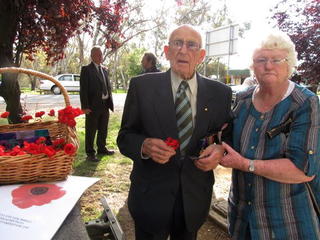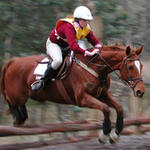Remembrance Day at Hall 2010
12 November 2010

Remembrance Day was again recognised in Hall, with a large and appreciative group attending the ceremony organised by the Rotary Club of Hall. The ceremony began with the mounting of the Guard by Army Reservists of the 5th Combat Engineering Regiment, and the music of Piper Jim Davey.
Club President Vic Gibbons then gave a welcome, including a special welcome to Jim Rochford, on whose initiative the Rotary Club established the Remembrance cairn as part of the Memorial Grove. [Our photo shows Jim, with Mrs Marjorie Rule, at the ceremony].
The President then introduced Group Captain Sheldon D. Kimber, Chief of Staff, Australian Defence College to give the Remembrance Day address, in which he made careful reference to the contribution of Hall district residents to armed conflict. (His speech is reproduced below)
Prayers were lead by representatives of the three churches - Father Bernie Maxwell, Mrs Dimity Manton, and Pastor Bernie Rodgers before wreaths were laid by representatives of Rotary, the Hall Rural Fire Brigade, and the Progress Association. The came the Ode of Remembrance, the 'Last Post' (by Bugler Luke Glassen, RMC Band), a minutes silence, and the raising of the flag (Amy and Annabell).
Many of those present proceeded to the Wood Duck Inn following the ceremony, where nibbles were generously contributed by the Rotary Club of Hall.
Address by Group Captain Sheldon D. Kimber, Chief of Staff, Australian Defence College:
"President of the Hall Rotary Club, distinguished guests, ladies and gentlemen, girls and boys - thank you for inviting me to give this Remembrance Day address. I feel both honoured and privileged to deliver this address to the Hall community.
Known originally as Armistice Day, Remembrance Day is an important date in Australia's national calendar. It commemorates the 11th hour of the 11th day of the 11th month; the day in 1918 when the guns of the Western Front fell silent after four years of continual, horrific and bloody warfare. From a population of fewer than 5 million, over 400, 000 Australians had enlisted, with over 300,000 deploying. More than 2/3rds of those deployed were casualties; over 61,000 died and 156,000 were wounded or taken prisoner. In terms of loss of life, it was, and remains, our most costly conflict.
On this nationally significant day each year, we pause to recognise the sacrifice of those men and women – we also take this opportunity to remember all those who have served Australia during the past 100 years, defending this nation and preserving our democracy and way of life.
It is a fact that Few Australian families were left untouched by the events of World War I. I note that Your Hall community was no exception. a much smaller community then, Hall lost two World War I veterans killed in action. They were: M. Brown and C. Hollingsworth and are recognised on plaques here in your Memorial Grove. Very appropriately Their sacrifice is enshrined – as also are 15 of their World War I Hall mates, who fortunately returned home at the end of hostilities, recognised on plaques in this Grove. I am not a Hall resident; however I understand that many of their relatives still live in and around Hall today. Indeed, I'm aware that the 'Southwell' family have obvious strong linkages to the four 'plaqued' Southwells separately identified in this Grove.
Some of you may not be aware that your small Hall community contributed some 34 veterans who subsequently served in either World War II, Korea or South Vietnam.
Now, thankfully, a great many Australians have no personal experience of war, and no way of knowing the anguish of enforced separation, or the greater grief of separations made permanent. And for that reason amongst others, it is appropriate to pause and reflect and remember. For most of us, not the reflection made by past generations to remember a loved one lost to war, but a promise to remember all who have been lost to war and to give thanks for their valiant service in defence of our freedom and to demonstrate the value we place in those freedoms so selflessly forged.
Most importantly, the central element of Remembrance Day ceremonies is an invited silence urging all Australians to observe at least one minute's silence. This opportunity for comtemplation and reflection helps ensure that tradition and prominent history is not lost; that the significant events of our past remain an important part of australia for present and future generations.
The hall community has made its contribution to Australia's history, and your attendance this evening, continues to recognise the sacrifice of our forebears in forging our country's future. Thank you again for your inviting me here this evening to participate in this ceremony with you, and for the privilege of being able to deliver this address".

